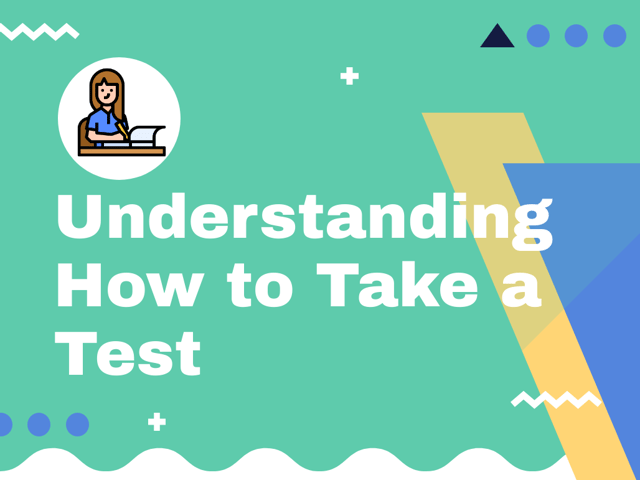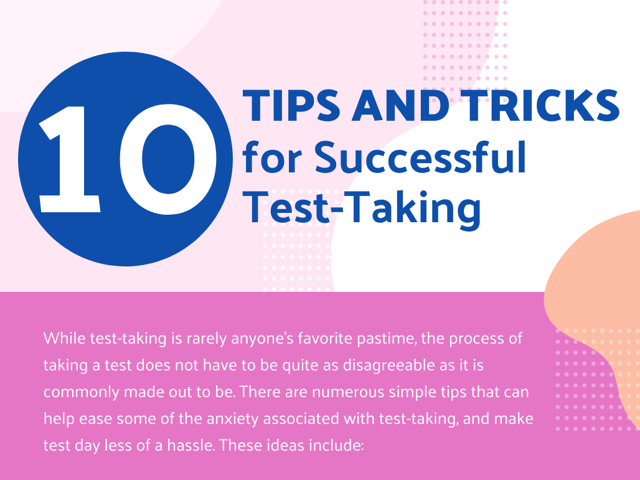
Understanding How to Take a Test
Although they often seem like cruel creatures, designed to inspire stress and fear, tests are truly intended to measure an individual’s knowledge, assess a teacher’s efficacy, gauge the retention of knowledge, and determine the proper placement of an individual in an educational setting. Although individuals may use test scores to inspire awe or envy, a low test score should not dictate a moral judgment or a feeling of personal failing; instead, it suggests the need for improvement, often on the part of both the student and the instructor.
Tackling Test Fear
The first step, then, in learning how to be an effective test-taker is to learn to not fear an exam’s end result, and instead recognize that a test score will simply let you and the test-giver know where you are in your scope or breadth of knowledge. With this knowledge under your belt, you can move on to understanding exactly what is being asked of you, as a test-taker.
Reducing test anxiety may involve utilizing some calming mental strategies, so seek these out. Knowing all about your upcoming test will help, as well. Approaching a test effectively depends on the type of test you are taking, the subject matter involved, and the time you are given to take it.
Test Type
There are two standard reasons for administering a test: examining knowledge, and examining reasoning. The difference between the two may seem minute, but it’s actually quite important.
-
Testing someone’s knowledge typically means asking straightforward questions. If the test is evaluating knowledge, you will know the general area that you should focus on, such as mathematics or science.
-
Testing someone’s reasoning requires a more complicated manner of questioning. It may involve providing two answers that seem similar, requiring test-takers to write an essay, or asking test-takers to select an answer that best answers a question, even if all answers can technically be correct. If a test is examining your ability to reason and determine where you are in your educational journey, studying for a single subject or small series of subjects is unlikely to aid you in your test-taking. A broader review of your education will deliver a more effective result.
Time Constraints
Many tests are timed, most often examinations of knowledge and placement tests. Other exams offer an unlimited window in which to take an exam. Each type of test requires a different approach.
Timed Tests
Timed tests often give only 1–3 minutes per question, and are testing not only your knowledge, but also your ability to work under pressure and your ability to reason in a hurry, so quickly identifying questions you know and moving on is ideal. This also means quickly looking over requirements, understanding what is being asked of you in each section, and identifying any problem areas, to which you can devote more time and attention. When you use this method, you free up mental space and clear some clutter. Then you can devote a larger swath of time to questions you may not be as comfortable or familiar with.
Note: Before test day, be sure you know if your test will allow going back to previous questions. Some computer-given tests do not.
Untimed Tests
In untimed tests, you may not want to use this same approach, as you can devote as much time as you need to answering each and every question. You should still work carefully and be sure you understand what is being asked, but you can do so in the order of the test questions if you want. Some people still prefer to take care of easy questions first, if that is permissible. Do what works for you.
Test Scope
This is an important consideration when planning your test preparation. Preparing for a large-scale test, such as a licensing exam or a placement exam, requires a different approach than preparing for a smaller exam, or a test designed to measure knowledge of a single, limited subject. Here are some ideas to help with preparation for a test when the breadth of knowledge for it is substantial:
- Breaking studying down into smaller pieces is essential, as it allows you to build confidence, focus your attention, and retain a great deal of information about a wide range of subjects.
- Studying each subject each day is useful, as it allows you to learn how to slide from one subject to the other, while it may not be as easy to move between subjects on test day.
- Identifying which parts of subjects will likely be included in the exam (using prep materials for that specific test, or using your own experience in a given field) and focusing on those will also allow you to prepare for a test with expansive subject matter.

Keep Reading

Union Test Prep Blog
It’s Almost Test Day—What Should I Do?
You’re approaching the day of your test, and it’s time to take care of …

Union Test Prep Blog
What Are Holistic Admissions?
The term “holistic admissions” alternately garners horrified eye rolls …

Union Test Prep Blog
Ten Tips and Tricks for Successful Test-Taking
While test-taking is rarely anyone’s favorite pastime, the process of t…